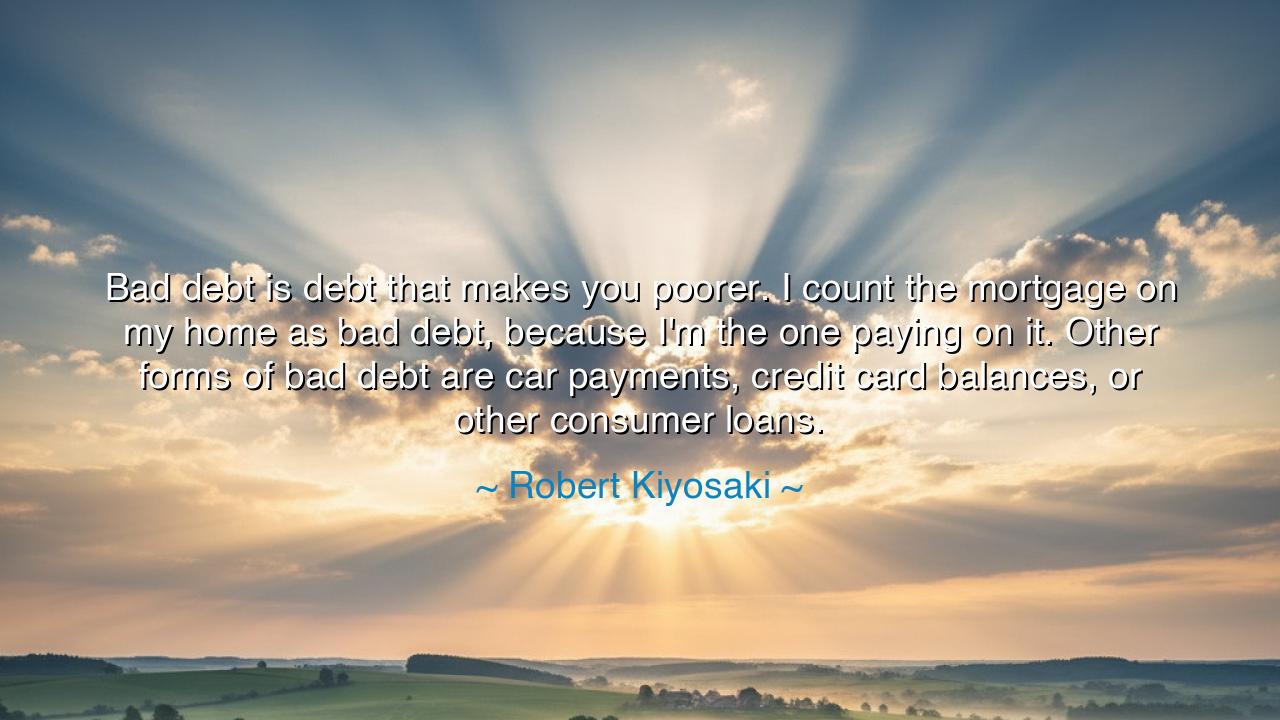
Bad debt is debt that makes you poorer. I count the mortgage on
Bad debt is debt that makes you poorer. I count the mortgage on my home as bad debt, because I'm the one paying on it. Other forms of bad debt are car payments, credit card balances, or other consumer loans.






In the words of Robert Kiyosaki, “Bad debt is debt that makes you poorer. I count the mortgage on my home as bad debt, because I'm the one paying on it. Other forms of bad debt are car payments, credit card balances, or other consumer loans.” — there is a teaching not merely about money, but about the laws of wisdom, self-mastery, and the discipline of value. Beneath its surface of finance lies the spirit of an ancient truth: that what binds a person is not only chains of iron, but also chains of obligation and ignorance. To understand debt is to understand one’s own power — for those who do not govern their wealth become servants to it.
In every age, the wise have warned that the careless handling of possessions leads not to comfort, but to bondage. Kiyosaki’s words echo the lessons of our forebears, who saw that the unexamined pursuit of luxury and status can drain the soul as surely as it drains the purse. Bad debt, as he calls it, is not merely a number owed — it is a condition of the mind, a blindness to the difference between what nourishes and what consumes. The home mortgage, the car payment, the glittering credit card — these are not evil in themselves, but they become chains when they serve vanity, not purpose; consumption, not creation.
The ancients understood this deeply. In the time of Solon, the great lawgiver of Athens, debt was not only an economic condition but a spiritual one. Many Athenians had sold themselves into slavery because of the weight of unpaid loans. Solon’s reforms, known as the Seisachtheia, or “shaking off of burdens,” freed them — not merely from the creditor’s grip, but from the ignorance that led them there. He knew that freedom could not exist where debt ruled the heart. So too does Kiyosaki teach that bad debt enslaves the modern soul — not by whip or chain, but by endless obligation to things that do not grow in value, nor in wisdom.
When Kiyosaki calls even his home mortgage a form of bad debt, he challenges the illusions of comfort that society sells us. The modern man is taught to believe that to own is to prosper. Yet, as Kiyosaki reminds us, ownership without profit is only another form of servitude — for if a home consumes wealth rather than creates it, it binds rather than frees. To the wise, a true investment is that which returns energy to its source, not that which endlessly drains it. Thus, the distinction between good debt and bad debt is not moral but mathematical, not emotional but elemental: does it make you stronger, or weaker? Does it build, or does it erode?
History gives us countless examples of this truth. Consider the fall of Rome, a civilization that once ruled the world yet collapsed under the weight of its own excess. The empire drowned itself in bad debt — borrowing for feasts, for vanity, for spectacle. Its people sought pleasure rather than productivity, luxury rather than legacy. In time, the treasury was empty, and the spirit of discipline that once built the empire was lost. This, too, is the fate of every individual who forgets the sacred balance between earning and spending, between creation and consumption. Wealth, like empire, must be built upon wisdom, or it will crumble into dust.
There is, however, a nobler path — the way of good debt, which serves the purpose of growth. Borrowing to acquire knowledge, to build a business, or to invest in assets that return value — this, Kiyosaki teaches, is the proper use of financial power. Just as a farmer borrows the land to yield fruit and return it enriched, so must we use our resources with intention and foresight. The wise do not fear debt, but neither do they serve it. They make debt their tool, not their master.
From this teaching arises a clear and enduring lesson: know the purpose of every coin that leaves your hand. Before you spend, ask — will this purchase nourish my life, or feed my vanity? Will it return value, or devour it? In the marketplace of life, every choice either builds freedom or deepens captivity. Let your wealth serve your purpose, not your pride. Learn the laws of money as you would learn the laws of the earth, for they are no less sacred.
So remember this, O listener: bad debt makes you poorer, not only in gold but in spirit. Guard your labor, for it is your life made visible. Seek investments that give back, that grow in wisdom as they grow in worth. Live simply, but think greatly. And if ever you are tempted to buy what dazzles but does not strengthen, recall the ancient wisdom hidden in Kiyosaki’s words: that the greatest wealth is freedom, and the greatest poverty is to owe your peace of mind to things that can never repay it.






AAdministratorAdministrator
Welcome, honored guests. Please leave a comment, we will respond soon